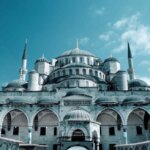Ramadan, the holy month, is well-known to people worldwide. Why is it considered sacred? It is because, during this month, Muslims receive numerous blessings and opportunities for worship, earning rewards from Allah (SWT).
Ramadan is known as the “Month of a Thousand Months” and is the ninth month of the Islamic lunar calendar. During this sacred month, there are numerous virtues and benefits. These benefits encompass both spiritual and physical aspects, as the month also contributes to your overall well-being.
Commonly referred to as the “Month of Fasting,” Muslims around the world fast daily, from dawn to sunset. The beginning of Ramadan is determined by the sighting of the crescent moon.
In the time of the Prophet Muhammad, the observance of Ramadan was established, following a period of fasting ‘Ashura and three days each month. The fasting of Ramadan was officially instituted in the second year of Hijriah or 624 AD when Prophet Muhammad migrated to Medina, marking the establishment of Eid prayers, zakat, and sacrifices.
As Muslims, it is essential to understand the virtues of Ramadan, as it encourages us to engage in acts of worship with more sincerity and devotion. Here are some of the virtues of Ramadan that can inspire you to seek Allah’s blessings more fervently.
Fasting in Ramadan Brings Happiness
As previously mentioned, fasting is a significant part of Ramadan, and it can indeed bring happiness. During the daylight hours, Muslims abstain from eating, drinking, and restraining their desires, such as anger and indecent speech. Fasting not only earns them spiritual rewards but also leads to physical well-being.
The Prophet Muhammad said: “Every good deed of the son of Adam would be multiplied, a good deed receiving a tenfold to seven hundredfold reward. Allah, the Exalted and Majestic, has said: With the exception of fasting, for it is done for Me and I will give a reward for it since he gives up his desire and food for My sake.” (Sahih Muslim)
In addition to the spiritual rewards, fasting in Ramadan offers numerous health benefits. Months of regular eating can lead to a build-up of toxins in your body, and fasting helps to cleanse your system. Therefore, fasting is not just a religious obligation but also a practice with considerable health advantages.
The Closing of Hellfire’s Gates
During Ramadan, the gates of Hellfire are closed, and the gates of Heaven are opened. This is due to the abundance of good deeds and reduced disobedience. In addition, the devils are chained during this month, preventing them from leading people astray.
As narrated by the Prophet Muhammad: “When the month of Ramadan starts, the gates of the heaven are opened and the gates of Hell are closed and the devils are chained.” (Sahih al-Bukhari)
Revelation of the Quran
The Quran was first revealed during the month of Ramadan. It is in this sacred month that the Quran’s revelation commenced. In Surah Al-Baqarah, Allah praises Ramadan as a month that is superior to all others. The revelation of the Quran serves as a source of guidance, emphasizing the importance of righteousness and piety.
Hence, Ramadan is a special month, setting the tone for humanity’s pursuit of good deeds and God-consciousness.
Multiplied Rewards for Good Deeds
The Prophet Muhammad said: “Every good deed of the son of Adam would be multiplied, a good deed receiving a tenfold to seven hundredfold reward.” (Sahih al-Bukhari)
Therefore, during Ramadan, each good deed is rewarded many times over. Engaging in acts of worship in this month is exceptionally meritorious. By increasing your devotion and practicing acts of kindness, you stand to gain abundant blessings from Allah.
Laylat al-Qadr (The Night of Decree)
Laylat al-Qadr, often referred to as the Night of Decree or Power, is a night of great significance. It falls on one of the last ten nights of Ramadan. On this night, Allah’s blessings and mercy are abundant, and acts of worship are multiplied in reward. It is a night when many Muslims seek forgiveness and pray for blessings.
The Prophet Muhammad said: “Whoever prays on Laylat al-Qadr out of faith and sincerity, their previous sins will be forgiven.” (Sahih al-Bukhari)
Forgiveness of Sins and Answered Prayers
The observance of various acts of worship in Ramadan, such as fasting, giving charity, and performing extra prayers, can result in the forgiveness of sins. It is a month where supplications made to Allah are often answered. Acts of devotion and repentance performed in sincerity can lead to the purification of the heart and the attainment of divine mercy.
Beneficial Zakat al-Fitr
Zakat al-Fitr is an essential aspect of Ramadan. It is a mandatory charity paid by those who can afford it. The Prophet Muhammad said: “The fast remains suspended between Heaven and Earth until the Sadaqat al-Fitr are paid.” (Sunan Abu Dawood)
Zakat al-Fitr purifies the souls and serves as a means of financial support for the less fortunate, especially during the joyous celebration of Eid al-Fitr. It creates harmonious relationships between the wealthy and the needy.
Strengthening Bonds through Taraweeh Prayers
One of the unique acts of worship in Ramadan is the performance of Taraweeh prayers. These are special nightly prayers that take place in the mosque or prayer area.
This act promotes a sense of community as Muslims gather together to perform Taraweeh. It fosters social interaction and strengthens relationships among neighbors and family members who join in these prayers.
Conclusion
Understanding the virtues of Ramadan is essential for Muslims as it can encourage them to be more devoted and committed during this sacred month. By engaging in acts of worship and demonstrating kindness, you can experience the abundant blessings and happiness that Ramadan brings.
It is a time for purification, devotion, and the pursuit of God-consciousness. May you benefit greatly from this blessed month and experience the joy of Eid al-Fitr, cherishing the bonds and achievements made during Ramadan.








